- Home
- Barry Unsworth
Losing Nelson Page 6
Losing Nelson Read online
Page 6
However, I did not, that night last February, dream of open skies and sunlit seas and the passage of Horatio to life again, but of that nightmare journey upriver with the fifty doomed men of the frigate Hinchingbrooke, the stream narrowing as the forest pressed dense and close on either side. There was no turning back. Horatio at the prow with his narrow back turned to me, I behind him in the same boat. He looks round once, his face is noseless, eyeless, mouthless, just a pale shape of flesh beneath the sharp wings of his captain’s hat. But I know it is at me he is looking; we are about to face something terrible together. From the banks on either side a massed sound of lamentation, sorrow falling on us like rain. The river takes a bend and we come upon the Spanish stronghold, fortress of the dead and the dying, open gates, litter of corpses, crawling survivors, the swarming glint of flies. The sound of mourning grows wilder, it fills the air. Suddenly I am alone, he is no longer with me …
I woke from this sweating. I was not Horatio in the dream, he abandoned me, I did not take his place. Otherwise, how could I dream of the besieged in their putrid prison, something he never saw? An echo of the Holocaust, filmed images of the heaped dead, the walking dying, central experience of our century whether we lived through it or not, pit into which all our nightmares flow?
For a long time I lay awake in the darkness. The intensity of the dream, that mingling of horror and grief, kept my mind on a gloomy track. I thought again of those dying dragoons, lost between the lake and the sea, fumbling to blow up the fort. No-one will ever know what became of them. That much, at least, we know about Jervis’s decapitated marine. Perhaps he was no farther than a foot away. The grotesque suddenness of that death, no gasp or cry. And soundless in effect, amidst all that din of battle. Only the brief song of the missile, then the splatter of blood and brain over the face and chest of the crusty old admiral. Why did he call for an orange? To demonstrate unconcern? Or did some stuff splash into his mouth? Probable, yes, though naturally beyond the touch of proof. It must have been a shock. There would have been an intake of breath, an involuntary gasp of surprise. Even so seasoned a campaigner … Yes, the viscid substance of the marine’s death, some of it entered his mouth, and he called for an orange to get rid of the taste. Naturally he stayed on the quarterdeck till victory was assured, stained with the marine’s blood and bits of his brain tissue and spinal marrow and the soft, fatty substances that had sheathed his nerves.
Somewhere that soldier’s name will be recorded, though I have never found it; also, just possibly, as an incident in some more general account, how he was standing at the moment of his death, whether loading or firing, and so on. But of course his name does not matter, what he was doing does not matter; he provided an occasion for his admiral, at the height of the battle, to call for an orange. Jervis acquired an extra name, he was created Earl St. Vincent. And Horatio, hero of the day, became Sir Horatio, Knight of the Bath …
Sea battle in those days so peculiarly designed for mutilations and maimings. A hail of missiles. Shrapnel from the cannon-shot, razor-edged projectiles from sliced and splintered timbers, whizzed through the crowded decks. Selective, however—death not a reaper but a sort of crazed sniper, here a face shorn off, there a leg carried away. Men rarely died in swaths. Sometimes, of course, when a ship was raked fore and aft—this was the fire Horatio had to suffer at Trafalgar, when he drove into the French line at right angles. But death in daily dress was the gouger, the slicer, lord of eviscerations and lopped limbs. And he, my Horatio, pacing back and forth on the quarterdeck, pausing to observe the progress of the battle, stars and ribbons prominent on his breast, showing no haste, showing no fear, as if he were out on a Sunday morning stroll, looking at birds or clouds through his telescope. What sublime conquest of self he gave proof of, not once but over and over, what shining bravery and quality of command. Nerves of steel, a courage not merely of endurance—that alone is not the hero’s brand—but possessing that fierce patience of the fighter who waits to deliver the killing stroke. The mystery of his courage. Admiration, the old admiration, flooded over me as I lay there. Ever since my talks with Penhas, I had loved him for this sauntering in the midst of terrible damage. The ugly dream receded, and I felt again that prickle of tears so common with me then and now.
My own first experience of death was on a Sunday morning, during a stroll in the country. It came in the form of one sick rabbit, which my father stamped on. I was five years old—it is one of my earliest memories. My brother, Monty, was with us; he is three years older. We were out on a country walk with my father. This was in Surrey, where we lived then—it was two years later that we came to live here, in this house. We were walking along a footpath, not very wide, clay-coloured, dusty—I suppose there had been no rain for some time. Open, heathy country. I have worked out that it was a Sunday; we were generally taken for walks on a Sunday morning if the weather was fine enough, while my mother, unaided on this day of the week, saw to the lunch.
We met the rabbit, or it met us—it was coming from the opposite direction, hopping slowly towards us along the edge of the path, not seeming disabled or distressed, not at first, though slower than you would expect a rabbit to be in the open and in full view. When we were quite close, it stopped, and I saw the gummy bulge of its eyes and I knew there was something badly wrong with this rabbit. Its head was too big. At the last moment, when we were almost upon it, fear supervened; it made an effort to get away, leaving the path and going off perhaps three yards into the grass. Then it stopped again. I saw now that the rabbit was trembling all over. I looked at my father’s face to see what we were to make of this business, but there was no expression on his face at all. A last impression of the bloated head, the swollen, suppurating eyes. Then my father, without a word, stepped off the path, approached the rabbit, raised his right knee well above the horizontal, and stamped down with force—a single, plunging motion. Then he briskly but thoroughly wiped his shoe in the grass.
Strange how clearly I could remember these actions in their exact sequence, yet had no certain recollection of the dead rabbit, nothing I could be sure belonged to the time. Images of pulped or squashed rabbits visited my mind frequently enough afterwards and still sometimes do, but I can never be sure they are authentic. The stamping and the wiping I remember well, however, the gray flannel trouser leg, two or three inches of greenish sock, the stout, cherrybrown brogue; this last could not have been much below my eye level at the time, when raised to stamping height—he was a tall man. He looked at us and I remember his face. We have put the poor beast out of its misery, he said.
I don’t know what I felt about this or what I feel now. We crave a dominant note, we seek in memory for the single element, one stain to colour the whole. But the tints do not blend, the colour eludes us. There was no balance in the thing. The dreamlike preliminaries, the loping, lolloping rabbit, my father’s casual stepping aside, the violence of the plunging shoe, that brisk rubbing in the grass.
We have put the poor beast out of its misery. He included Monty and me in that decisive act. It was true, he had done a merciful thing. A paradox too difficult for a child to appreciate, the intention of mercy expressed in a gesture so seemingly brutal. And then there was the look on his face, a certain look of alertness, almost eagerness, as he scanned our faces to see if the lesson had gone home.
That is the earliest memory I have of my father’s face; the latest is the face of his death, that settling of stillness, as if he had answered his own question. But what lesson was it that he was seeking to bring home to us? This is the nature of reality, this is what the world is like, a place of suffering and pain which a man must confront with decision? Something like pleasure on his face, a sort of brightness; not at killing the rabbit, I don’t think he took the smallest pleasure in that, but at the stern message implicit in it. He was observing his sons’ faces, driving home a moral, making a useful dent on the soft minds of Monty and me. The memory is all violence now, like the springing of a trap in a silen
t place; the moral side of it has been diluted. In later years my father seemed often to be held in that same incommunicable woe of the rabbit. Not his eyes, not the alertness of his glance, that was unimpaired …
I did not want to think about this. Horatio was my refuge, as so often. I felt the impulse to look again at the face of his father. For some minutes I lay there, summoning resolve. Then I got up, put on my heavy dressing gown, and went along to the kitchen, with the idea of making some tea and taking it down to the basement.
6
It was not yet light and very cold. I always turn the heating off before going to bed; it makes the air too dry and gives me headaches. Besides, a cold bedroom is more manly, or so I was brought up to believe. Apart from anything else, it’s a long-standing habit and habit is law, habit is safety; without habits we would just flop around and die. I put the heating back on now, however, and began to make the tea.
By then it was taking me a long time to make tea. In fact, everything seemed to take longer and longer. I urgently wanted to look at Edmund Nelson’s face, but things had to be done in order, I knew I couldn’t take short cuts. I had given up cooking because it took up too much time, all the pondering what to buy and getting lost in supermarkets. And there had been times when it conflicted with some important date in the Horatio calendar—I celebrated all the key events of his life. I didn’t mind giving it up, there is no framework in it, no procedure, as an activity it is messy, amorphous, clogged with alternatives. Mrs. Watson would have cooked for me, at least on the days that she came, but I didn’t want that, it was too much of an involvement.
Run the cold water for ninety seconds to flush out the pipes, kettle two-thirds full, warm the pot, two level teaspoons of Darjeeling, catch the kettle at the precise moment it rises to the boil, on no account must it bubble or oxygen is lost and then you have to start all over again. Pour from a height of eight inches—I had made a pencil mark on the wall. Tea cosy. Allow to stand a full three minutes. Strainer at the ready, resting on its blue saucer. I believe in procedures. When our world comes crashing down about our ears, when this planet chokes in its own fumes or stings itself to death like a demented scorpion, it will be owing to neglected procedures. Horatio knew the importance of procedures—none better.
I have my own mug, blue and white, with a thin band of silver going round the top. It has my monogram on it in a panel of pale blue, two curly C’s twining together, Charles Cleasby. It was a present from my mother when I was six years old, one of a number of things given to me when I came home from hospital after my appendix operation. It seemed to me miraculous that she should have found a mug with just my initials on it, among all the initials and all the children in the world. Only years later, long after she had left us, did it occur to me that she might have had them specially put on. I had been drinking my tea out of that mug for thirty-five years. Apart from the rug in the sitting room, it was all of her I had left.
No milk—I never touch milk. One cube of Demerara sugar. Mug in hand, I went down to the basement. I went through to the small middle room that lies between my collection of Nelson exhibits and the ops room with the model ships. This was my picture gallery, mainly reproductions—original portraits are naturally difficult to obtain even if one could afford them, though I had some good paintings of sailing ships, among them one by John Nathan, R.A., of HMS Victory with sails loosed for drying at Spithead.
Fanny Nelson was there, the wronged wife; and Emma Hamilton, the adored mistress; and Sir William Hamilton, the complaisant husband; and Horatio’s uncle, Captain Maurice Suckling, who gave him his first chance; and Jervis, he of the orange; and Collingwood, who supported Horatio so loyally at the Battle of Cape St. Vincent; and Hardy, who kissed him when he was dying. Horatio himself was not to be found on these walls. I hung all the likenesses of him that I had collected in the exhibits room; he looked down over the cabinets and showcases that commemorated his wonderful life.
I stood before the portrait of Edmund Nelson, sipping my tea, warming my hands on the mug. He was seventy-eight when Beechey painted this likeness of him. Less than two years to live. A long, fairbrowed, narrow face, lugubrious, scraped close to the bone with age; resigned, yes, but not serene. The tones of the painting are sombre; his black habit merges into the dark sepia of the background, his twotailed clerical stock is tucked close up to his bony chin. Submission in the face, feeling suppressed, something feminine. Not quite the face you would expect in a Norfolk parson of yeoman stock … My father’s face quite different, all straight lines: square jaw, sheer planes at the temples, level eyes and brows, large, regular teeth—the stem of his pipe had bite marks on it.
The man who begot me, the man who begot Horatio—in death they became contemporaries, as all the dead are. In the face before me now there was no trace of the angelic, no hint of breaking the line. Duty his creed, as it was his son’s, but like many of the virtues we extol, this can take forms active or passive. The Reverend Nelson’s was the latter sort, finding its reward in sufferance. Not so Horatio, for whom duty was a seeking out, a fulfilment in fame.
His was the ambition of genius. But it was the lesson of obligation, of doing what one is called upon to do, that the father passed down. What Horatio made of it was his own. Thank God I have done my duty. Probably the last words anyone heard him say, as he lay dying in the dimness belowdecks at Trafalgar. The surgeon who attended him and recorded the last hours of his life heard him murmur these words some minutes before the voice was lost forever. Duty done, victory achieved—it was the same thing for him, the duty lay in the achievement. And so it is with me; I am the same, in spite of appearances. My doubts and fears, these were his purifying discharge. A medal has two faces; my face was hidden against his breast.
Still looking closely at that eroded face, I thought of the stories of Horatio’s childhood that have passed down to us. Courage, leadership, indomitable will, all so precociously shown by this slightly built, pale-faced boy. How, one Norfolk winter, he battled through great drifts of snow to get to school, urging on his faltering—and much more robust—elder brother, because they had promised their father to do their utmost. Remember, brother, it was left to our honour. How, at an even tenderer age, he wandered away, got lost in the woods as darkness fell, was found after long search, sitting by the side of an impassable stream. Surprising that fear did not bring you home, they said. Fear? I never saw fear. What is it?
Useless to look for clear outlines in this twilight of infancy. These were anecdotes told after his glorious death, after he had become the saviour of his country, memories embroidered into legend. The life of a hero is a grafted tree, rooted in fact, branched with hearsay. And Horatio Nelson is the English hero; he has no rival. No threat of rivals in the future, either—this country will never produce heroes again.
Equally useless to judge by faces. This mild-faced man I was looking at now was capable, when roused, of seizing a housebreaker by the collar and throwing him bodily out of the house. Horatio and his brothers and sisters, when old enough to sit at table, were forbidden to touch with their backs the backs of the chairs. Weak sight was not deemed a reason for spectacles. Yet the rector did not strike his parishioners as a man of forceful character, and he considered himself to be lacking in firmness. “Tremulous over trifles and easily put in a fuss,” to use his own words. Always something strange in the progenitors of genius … Self-denial imposed on a sensuous and emotional nature—was this the key to both father and son? Quite suddenly, while still formulating the question, I felt that same gathering of tears behind the eyes, but they were more urgent now; I knew that if I allowed my features to relax, I would blub in good earnest. I kept my face stiff and fought it off, knowing the cause quite well. It was the grief of never grasping, never fully knowing. Horatio had occupied my life, I knew more about him than anyone else because I was his heir, I had inherited his being. The conviction of this had grown stronger in the years that had passed since my chats with Penhas; it had been fe
d by both study and intuition. But still I could not reach to the essential part, the mystery of his courage.
I did not then, that February night, as I clutched my mug and resisted the tears, see myself as an angel like him, a creature of radiant violence. That came later. At the time I thought of myself merely as a repository of his essence, a sort of memorial urn. But I knew that the same forces had moulded us both—thoughts of his childhood led me always back into the labyrinth of my own. For him the lesson had been duty. What lesson did my father give to me, what guiding principle? Put things out of their misery. That look of alertness, a brightness on his face. My father was a watcher. Not, I think now—I permit myself to think now—a very kind one. Selective, highly so. Unobservant of many things, unseeing, locked in some cold trance of self-absorption, nevertheless he watched our faces. My mother would hesitate in replying to him, beginning in one way and changing to another, and he would watch her with that same expression, a sort of expectancy, a hope of entertainment, in which there was also, when I think of it now, the ironic certainty of disappointment. Afterwards, long after she had gone, it came to me that she must have been afraid of him, as Monty and I were, though I cannot remember him ever raising his voice.
I looked at my watch: ten minutes past four on the morning after the great victory of Cape St. Vincent. Did Horatio manage to get some sleep in these morning hours? So much can never be known to us—whether he woke or slept, what he thought of in this aftermath of his triumph. The night before the battle he had not slept at all, and in the action itself he was wounded by a shell splinter which, though he described it as of no consequence, gave him acute pain for some days afterwards and must have made sleep difficult. He was still awake at 2 A.M. to receive the note of casualties aboard his ship—sixty dead and wounded. We know that he wrote to his friend Collingwood later that same morning to thank him for his support in the engagement. Perhaps in the space between he was able to snatch some hours of sleep.

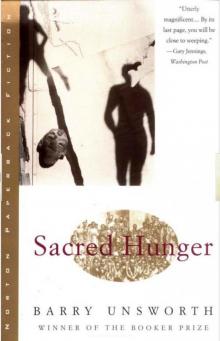 Sacred Hunger
Sacred Hunger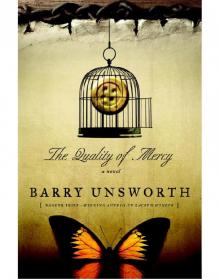 The Quality of Mercy: A Novel
The Quality of Mercy: A Novel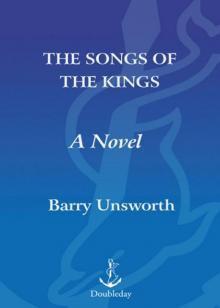 The Songs of the Kings: A Novel
The Songs of the Kings: A Novel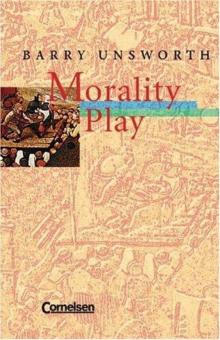 Morality Play. Mit Materialien. (Lernmaterialien)
Morality Play. Mit Materialien. (Lernmaterialien)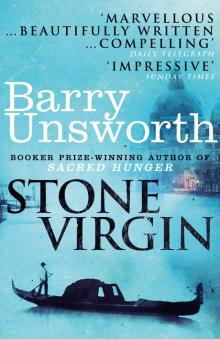 Stone Virgin
Stone Virgin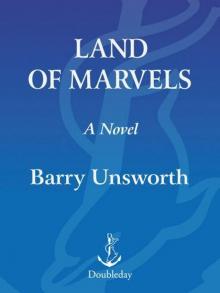 Land of Marvels
Land of Marvels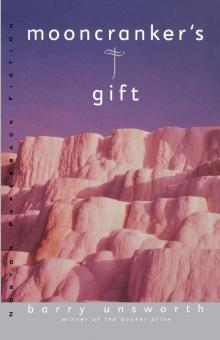 Mooncranker's Gift
Mooncranker's Gift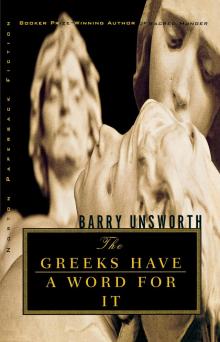 The Greeks Have a Word for It
The Greeks Have a Word for It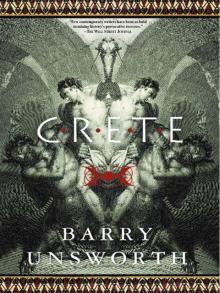 Crete
Crete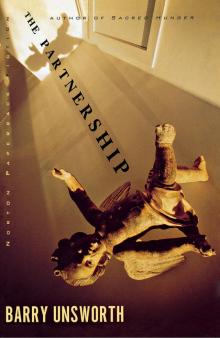 The Partnership
The Partnership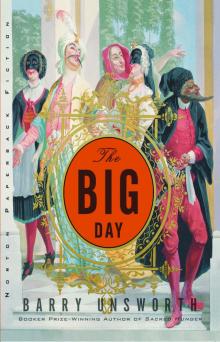 The Big Day
The Big Day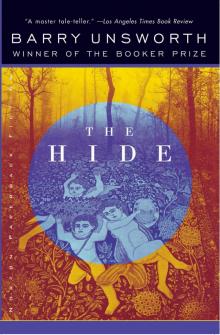 The Hide
The Hide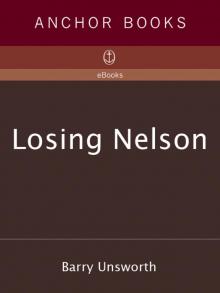 Losing Nelson
Losing Nelson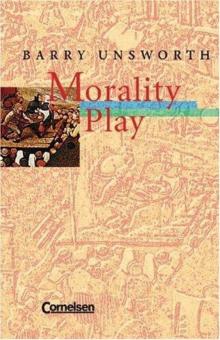 Morality Play
Morality Play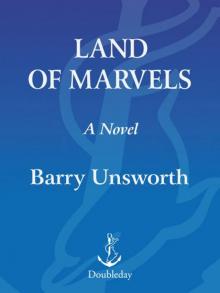 Land of Marvels: A Novel
Land of Marvels: A Novel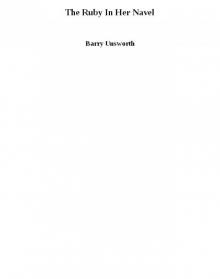 The Ruby In Her Navel
The Ruby In Her Navel